The humanitarian catastrophe in Gaza has reached a new, devastating low, as the head of the International Committee of the Red Cross (ICRC) described the territory as “worse than hell on Earth.” This stark assessment comes as aid distribution centers—vital lifelines for the besieged population—were forced to close, following a series of deadly incidents in which dozens of civilians were killed near these hubs.
Aid Centers Close as Violence Escalates
On Wednesday, aid distribution centers across Gaza shuttered their doors for the day after the Israeli military declared roads leading to these sites as “combat zones.” The Gaza Humanitarian Foundation (GHF), a new and controversial aid network backed by the US and Israel, announced the closure to “update, organize, and enhance efficiency” of its operations. The Israeli Defense Forces (IDF) warned that access to these centers and the roads leading to them would be strictly prohibited, citing security concerns.
The closures follow a string of deadly incidents. According to the Hamas-run Civil Defence Agency, at least 27 Palestinians were killed by Israeli gunfire near a distribution center overnight on Tuesday. This marked the third fatal event in as many days along the route to a GHF facility. The IDF stated that its troops fired after identifying individuals “deviating from the designated access routes,” but eyewitnesses and international medical teams described scenes of “total carnage” as hungry civilians were targeted while seeking food and basic supplies.
Mounting Civilian Toll and International Outcry
The violence at aid sites has intensified criticism of the new aid distribution system, which replaced the United Nations’ operations after Israeli allegations that UN agencies failed to prevent Hamas from diverting supplies—a claim the UN denies. The GHF, employing private armed security, now operates under Israeli military oversight, but the UN has declined to collaborate with it, citing concerns over impartiality and effectiveness.
International condemnation has mounted. UN Secretary-General António Guterres called for an immediate and independent investigation into the killings, expressing horror at reports of Palestinians being shot while waiting for food in Rafah. The Red Cross reported treating 179 injured, with at least 21 fatalities confirmed at its field hospital. Médecins Sans Frontières (Doctors Without Borders) and other medical organizations described treating patients with gunshot and shrapnel wounds, many in critical condition.
Western diplomats have voiced deep concern and dismay at the killing of desperate Gazans near aid hubs, warning that such incidents risk undermining any credibility of the current humanitarian response and further isolating Israel diplomatically.
“Hell on Earth”: Humanitarian Collapse
Mirjana Spoljaric Egger, ICRC president, warned that the humanitarian crisis in Gaza has reached unprecedented levels. “We now find ourselves in a situation I would have to describe as hell on earth,” she told reporters, highlighting the lack of water, electricity, and food in many areas. The ICRC’s field hospital, a critical facility, faces the prospect of running out of supplies within weeks due to the ongoing blockade.
The World Health Organization echoed these warnings, noting that most hospitals in Gaza operate at minimal capacity, with severe shortages of antibiotics, blood, and other essentials. The Israeli blockade, reinforced since March, has left thousands buried under rubble and prevented emergency services from reaching those in need. Ambulance crews and civil defense teams have also been targeted, compounding the crisis.
A Population on the Brink
The cumulative impact of the war and blockade is catastrophic. Hunger, displacement, and economic collapse have fueled social breakdown. Children are increasingly vulnerable to violence and exploitation, and those with disabilities are especially at risk. The UN has warned that the ongoing destruction threatens the very future of Palestinians in Gaza as a viable community.
As aid centers remain closed, and with no immediate solution in sight, the people of Gaza face a grim and uncertain future. The international community’s calls for accountability and humanitarian access grow louder, but for now, Gaza remains, in the words of the Red Cross chief, “worse than hell on Earth”.

